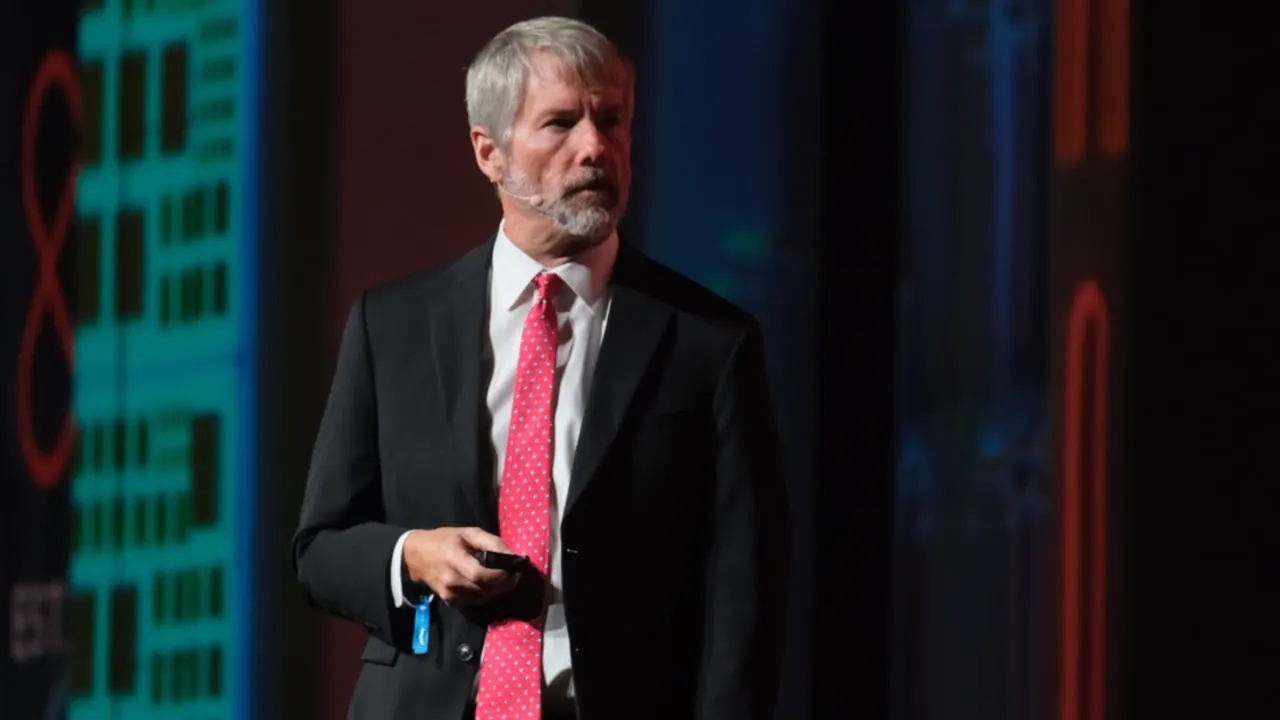Strategy has acquired 20,356 BTC for ~$1.99B at ~$97,514 per bitcoin and has achieved BTC Yield of 6.9% YTD 2025. As of 2/23/2025, we hodl 499,096 $BTC acquired for ~$33.1 billion at ~$66,357 per bitcoin. $MSTR https://t.co/mNWDaXRE7N
— Michael Saylor⚡️ (@saylor) February 24, 2025
Coin Prices
BTC
$68,208.00
0.46%ETH
$1,974.21
1.07%XRP
$1.44
1.31%BNB
$629.77
2.90%USDC
$0.999975
-0.00%SOL
$85.14
1.36%TRX
$0.286572
0.54%DOGE
$0.100068
1.05%FIGR_HELOC
$1.036
0.64%BCH
$569.60
2.60%WBT
$50.86
-0.15%ADA
$0.283862
1.97%USDS
$0.999923
0.00%LEO
$8.62
-0.84%HYPE
$30.34
2.72%LINK
$8.91
2.80%USDE
$0.998755
-0.00%XMR
$329.13
-2.31%CC
$0.159195
0.06%XLM
$0.162976
0.61%USD1
$0.99898
0.01%RAIN
$0.00957548
-1.56%ZEC
$261.79
0.60%HBAR
$0.100019
1.02%LTC
$55.02
2.23%PYUSD
$0.999546
-0.00%AVAX
$9.26
0.34%SHIB
$0.00000651
3.22%SUI
$0.957377
0.84%WLFI
$0.120015
3.22%TON
$1.33
-2.46%CRO
$0.07866
0.81%XAUT
$5,090.92
1.54%PAXG
$5,122.55
1.58%M
$1.34
-1.83%DOT
$1.39
6.21%UNI
$3.64
6.40%MNT
$0.636661
2.74%BUIDL
$1.00
0.00%AAVE
$120.78
-3.40%PEPE
$0.0000043
1.68%ASTER
$0.72986
3.27%USDF
$0.996873
-0.02%TAO
$181.35
1.45%OKB
$79.52
0.11%BGB
$2.33
-0.96%USDG
$0.999935
-0.00%PI
$0.174978
0.07%USYC
$1.12
0.00%RLUSD
$0.999951
0.01%HTX
$0.0000017
-0.19%ETC
$9.63
15.67%SKY
$0.064304
3.24%NEAR
$1.10
8.26%ONDO
$0.271074
2.32%BFUSD
$0.998926
0.03%PUMP
$0.00212273
0.85%ICP
$2.24
3.77%USTB
$11.00
0.01%ATOM
$2.38
2.72%POL
$0.110731
3.35%GT
$7.18
0.30%WLD
$0.394775
2.77%KCS
$8.52
1.48%NIGHT
$0.059992
-3.21%HASH
$0.01794575
-1.58%QNT
$66.03
-0.46%ENA
$0.111456
0.66%NEXO
$0.901076
4.87%MORPHO
$1.59
2.58%KAS
$0.03149915
5.33%USDTB
$0.999274
0.10%TRUMP
$3.52
-6.63%ALGO
$0.090424
0.47%FLR
$0.00944766
1.07%EUTBL
$1.23
0.17%RENDER
$1.49
1.53%FIL
$1.006
9.04%USDD
$1.00
0.07%JAAA
$1.027
0.00%XDC
$0.03584768
2.44%OUSG
$114.37
0.02%APT
$0.903589
4.19%USDY
$1.10
-0.10%VET
$0.00786747
1.24%BDX
$0.080249
-0.06%ARB
$0.103471
8.38%BONK
$0.00000646
3.26%JTRSY
$1.095
0.00%USD0
$0.997818
-0.06%STABLE
$0.03010179
-1.49%GHO
$0.999663
-0.03%JUP
$0.159741
2.17%A7A5
$0.01267818
-1.74%PIPPIN
$0.49458
-0.27%TUSD
$0.999289
0.05%SEI
$0.071466
1.41%USDAI
$0.999909
-0.00%FTN
$1.089
0.31%STX
$0.257982
1.12%EURC
$1.18
0.14%PENGU
$0.00702848
2.48%DASH
$34.89
3.46%CAKE
$1.31
3.82%KITE
$0.237186
-12.03%XTZ
$0.396096
2.65%VIRTUAL
$0.650911
-0.22%DCR
$24.43
1.30%KAU
$171.14
5.95%FDUSD
$0.999093
0.02%IP
$1.11
1.18%FET
$0.169199
1.83%INJ
$3.82
16.35%JST
$0.04298871
0.50%LIT
$1.50
1.27%CHZ
$0.03612432
-4.67%CRV
$0.245653
1.17%CTM
$0.083157
0.97%ETHFI
$0.476449
2.87%ZRO
$1.69
14.53%USX
$0.999679
-0.00%BTT
$0.00000034
-0.01%NFT
$0.00000034
-2.60%KAIA
$0.056416
0.54%BSV
$16.51
2.46%SUN
$0.01694701
-0.35%PRIME
$1.02
0.03%PYTH
$0.054997
2.54%GNO
$118.78
0.41%GRT
$0.02874429
7.75%ADI
$3.16
1.55%TIA
$0.34521
6.27%IOTA
$0.070489
3.04%SPX
$0.325807
-3.00%H
$0.166435
-0.03%AERO
$0.325273
2.07%FLOKI
$0.00003089
1.76%JASMY
$0.00587359
2.68%CRVUSD
$0.998273
0.59%LDO
$0.33581
2.97%HNT
$1.52
6.01%OP
$0.133008
2.90%CFX
$0.053949
4.37%FRAX
$0.993835
0.46%OHM
$17.47
0.82%ENS
$6.94
4.89%BTSE
$1.62
1.60%SYRUP
$0.226342
0.90%TEL
$0.00272666
-2.77%2Z
$0.073826
0.88%STRK
$0.04611286
-0.67%ZK
$0.02028843
1.25%AB
$0.0024486
-2.92%NUSD
$0.999026
-0.01%SAND
$0.086071
3.00%MON
$0.02123522
2.96%WIF
$0.226495
2.55%AXS
$1.34
2.14%TWT
$0.530521
0.41%USTBL
$1.075
0.01%YLDS
$0.999894
-0.01%USDA
$0.988296
0.02%ULTIMA
$5,747.02
-4.72%AUSD
$0.999716
-0.01%MYX
$1.12
-9.89%XPL
$0.099838
6.45%ZBCN
$0.00214648
2.76%THETA
$0.208284
8.73%BCAP
$22.86
0.00%PENDLE
$1.24
3.21%APEPE
$0.00000097
0.21%LUNC
$0.00003713
1.52%NEO
$2.78
2.33%UDS
$1.57
3.63%MANA
$0.099877
2.59%VSN
$0.053206
0.65%XCN
$0.00511301
-1.12%BORG
$0.192896
-2.21%FF
$0.080896
1.61%GALA
$0.00400528
3.25%PC0000031
$1.00
0.00%VVV
$4.27
-10.47%FARTCOIN
$0.187385
1.31%BAT
$0.123116
2.43%CVX
$1.98
0.63%FDIT
$1.00
0.00%WFI
$2.24
2.11%COMP
$18.29
1.04%RAY
$0.656312
0.13%IUSD
$0.999786
0.02%S
$0.04548274
3.60%BARD
$0.757708
-0.23%TIBBIR
$0.170979
18.72%GLM
$0.169375
-0.51%REAL
$0.054023
0.02%SENT
$0.02328583
4.37%MX
$1.80
-0.02%KOGE
$47.99
0.02%RIVER
$8.28
5.57%FLUID
$2.09
0.46%XEC
$0.00000808
2.91%SIREN
$0.219922
1.72%SATUSD
$0.994536
0.03%EURS
$1.27
0.15%MWC
$14.00
-7.52%USDF
$0.998091
-0.07%THBILL
$1.013
0.08%GUSD
$1.00
0.22%TRAC
$0.33351
-0.37%RUNE
$0.415986
4.15%IMX
$0.171077
5.27%0G
$0.683722
4.58%WEMIX
$0.311863
0.89%9BIT
$0.01717056
15.84%SFP
$0.277525
-0.55%EGLD
$4.68
2.65%AR
$2.09
5.77%ZANO
$8.99
-0.57%A
$0.083798
2.32%JTO
$0.306917
-3.58%1INCH
$0.094356
2.08%RAVE
$0.566311
0.86%SNX
$0.383914
1.11%B
$0.131738
-1.83%WAL
$0.08156
-1.23%GOMINING
$0.323016
-2.05%ACRED
$1,097.09
-0.03%BAN
$0.130003
-3.05%RLB
$0.074021
1.11%AMP
$0.00151882
-0.02%KTA
$0.255641
-1.04%DOLA
$0.995345
0.09%LION
$0.0041175
-0.17%BERA
$0.58472
-0.07%COCO
$0.124934
5.49%OZO
$0.130612
-0.09%BMX
$0.354537
-1.86%QRL
$1.51
-14.83%PUSD
$0.995734
0.00%CUSD
$0.989617
0.95%BEAM
$0.0023171
1.47%EIGEN
$0.197592
0.73%LPT
$2.37
2.24%DEXE
$2.49
11.03%COW
$0.207615
4.15%SKR
$0.01996172
-2.51%AWE
$0.058659
-0.96%CASH
$0.999843
-0.01%
